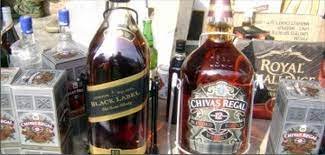According to a press statement issued by the proscribed Revolutionary People’s Front (RPF)’s Deputy Secretary, Publicity Roben Khuman, RPF said it has not yet lifted the ban imposed on the import and sale of Indian Made Foreign Liquor (IMFL) in the State. It also appealed to all the people to stay away from all those individuals involved in importing and selling IMFL.
The statement further said that the Government of India sent huge numbers of additional military forces to Manipur in the early 1980’s as a new chapter of the liberation movement unfolded in the State. It also alleged that Indian Made Foreign Liquor (IMFL) and narcotic drugs are important elements of the Indian military forces’ covert military operations.
Soon after their arrival in Manipur, the military forces started employing intoxicating substances as a tool for suppressing the liberation movement and preventing the emergence of revolutionaries.
With their canteens serving as operation centres, the military forces started distributing IMFLs profusely to the masses, it alleged.
During those days, if anyone was found with a bottle of IMFL when he was frisked by military personnel, he was appreciated openly by the military personnel and they even patted the person on the back, it said.
The outfit claimed that their cadres had to sometimes carry IMFL bottles just to get past checking/frisking points of military forces.
Taking serious note of how the Government of India was using IMFL as a tool for suppressing the liberation movement, how IMFL threatened the very foundation of Manipuri society and considering its adverse impacts on the State’s economy, the RPF banned the import and sale of IMFL in Manipur from 1990 and the outfit’s position on the matter has not changed till date, it said.
Before 1980, some rich people of Manipur and outside used to smuggle heroin from the Golden Triangle to Bombay (Mumbai), Goa, etc.
Except for a few rich individuals, there was no case of extensive abuse of heroin in Manipur during those days. But after 1980, narcotic drugs, particularly heroin became another key tool of the Government of India’s covert counter-insurgency operation, it alleged.
As the Government of India’s alleged offensive fuelled by illegal drugs became a serious threat to society, the RPF set up the Special Task Force (STAFORCE) and launched a dedicated campaign against illegal drugs, according to the statement.
Taking advantage of the Government of India’s covert operation, many military officers, bureaucrats, politicians and some people closely associated with them started smuggling different types of narcotic drugs.
There have been reports of seizure of narcotic drugs by security forces. But these seizures were made only after conflicts erupted among the drug smugglers and they disclosed each other, it alleged.
Even though military forces had no qualms about committing all kinds of excesses during counter-insurgency operations as the Armed Forces Special Powers Act (AFSPA) was always there to protect them, there is no such Bill or Act that openly protects them from their covert operations of which IMFL and narcotic drugs are the main weapons, the outfit alleged.
There have been many cases of arrest of military officers, bureaucrats, politicians, and their associates along with narcotic drugs but all these cases were hushed up secretly after some time, the RPF remarked.
It then asked what happened to the high-profile drug seizure cases of Kangla, Tulihal Airport, Moreh road, etc in which military officers, bureaucrats, politicians, and their associates were allegedly involved.
Many observers have already described the State Government’s War on Drugs as a losing battle because the Government of India has been allegedly sponsoring drugs as a part of its covert operation against insurgency in Manipur.
The State Government is only doing the ‘clean-up act’ by declaring the War on Drugs just to save the face of India, it alleged.
The outfit went on to allege that the State Government would not be able to do anything against the drug menace because they are only following the diktats of Delhi.
When Manipur was declared a Dry State in 1991, it turned out to be a severe handicap to the Indian military forces.
For this very reason, Delhi exerted strong pressure on the State Government to lift the prohibition.
As a result, the State Government recently lifted the prohibition claiming that it would enable the Government to earn a revenue of Rs 300/400 crore annually, it remarked.
The outfit then alleged that the real reason for lifting the prohibition was the Centre’s strong and persistent pressure.
It only shows that the State Government would not be able to do anything against drugs and other intoxicating substances for they are only dancing to the tune of the Centre, the outfit alleged.
It is up to the people to save society from the drug menace allegedly created by Delhi and the State Government, RPF asserted.
Signpost News is an Imphal-based media house that focuses on delivering news and views from Northeast India and beyond.

